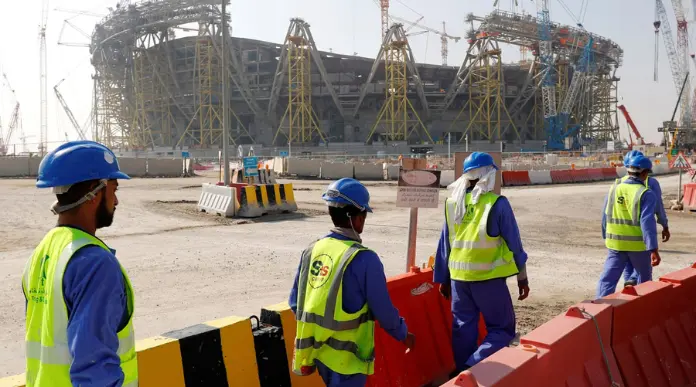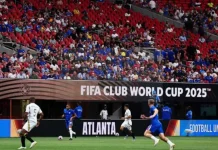The 2022 FIFA World Cup in Qatar, lauded globally as a celebration of sport and culture, was overshadowed by grave human rights violations. As fans reveled in world-class football, thousands of migrant workers faced hazardous conditions, forced labor, and, for many, death. Despite promises of labor reform, Qatar’s deeply entrenched Kafala system and FIFA’s limited oversight facilitated an environment where modern slavery could thrive. This article investigates the structural failures and human cost of one of the world’s most-watched events, shedding light on how FIFA’s inaction and Qatar’s exploitative policies perpetuated systemic abuse.
The Global Landscape of Modern Slavery
Forced Labor and Migrant Vulnerability
Modern slavery, affecting over 50 million people globally, thrives under conditions where legal protections are weak and economic desperation is high. Migrants are particularly vulnerable—three times more likely to face forced labor than non-migrants. Over half of those affected are women and girls, many of whom are employed in domestic or informal sectors.
These global trends converge sharply in the Gulf states, especially Qatar, where foreign workers make up more than 90% of the population. Drawn by the promise of opportunity, these workers often fall victim to labor systems that offer little protection and leave them at the mercy of exploitative employers.
Qatar’s Kafala System: Legalized Control and Coercion
Sponsorship System as a Tool of Exploitation
At the heart of labor abuses in Qatar lies the Kafala system, a legal structure that ties a worker’s immigration status to their employer. Under this arrangement, workers cannot change jobs or leave the country without permission—conditions that trap them in cycles of abuse.
Although Qatar pledged to reform the system ahead of the World Cup, watchdog groups like Amnesty International report that meaningful change has been cosmetic at best. Exit permits, job transfer restrictions, and threats of deportation persist, enabling a legal form of coercion tantamount to modern slavery.
Reforms in Name, Not Practice
While legislative changes were announced—including the introduction of a minimum wage and the ability to change employers—implementation has been weak. Many employers flout the law without consequence. Workers who attempt to assert their rights face intimidation or lose access to basic services, such as food and accommodation, provided by employers.
The Human Toll: Deaths, Debt, and Despair
Uncounted Deaths and Hazardous Conditions
The construction and service demands of the World Cup created an insatiable appetite for cheap labor. This led to a reported over 4,000 migrant worker deaths, though Qatar disputes these numbers. Many died from “natural causes” in sweltering heat, often after working excessive hours with minimal breaks.
Notably, workers from Nepal, India, Bangladesh, and Ghana were among the worst affected. One Ghanaian security guard, Marcus, described working 12-hour shifts, seven days a week, for wages barely above subsistence level—all while repaying US$400 in recruitment fees, placing him in debt bondage.
Exploitation in Every Sector
Beyond construction, labor abuses extended to hospitality, security, and transportation. Investigations revealed that even FIFA-accredited luxury hotels were paying workers less than £1 per hour and restricting their ability to leave or change jobs. Workers lived in overcrowded, unsanitary housing and were routinely denied days off during the tournament.
FIFA’s Accountability Crisis
A Moral and Legal Obligation Ignored
As the organizer of the World Cup, FIFA is bound by the UN Guiding Principles on Business and Human Rights, which require due diligence to prevent human rights violations in all associated activities. Yet FIFA’s response to the labor crisis in Qatar has been characterized by delayed action, vague promises, and inadequate enforcement.
Despite years of public criticism, FIFA did not enforce labor rights as a condition for hosting the tournament. It failed to demand the abolition of the Kafala system or to ensure that affected workers received compensation. Nearly a year after the World Cup ended, many exploited laborers still await justice.
Commercial Interests Over Human Rights
FIFA’s inaction reflects a prioritization of profit and spectacle over human dignity. Its reluctance to confront Qatar’s labor violations raises questions about its integrity and values. Critics argue that by proceeding with the tournament despite well-documented abuses, FIFA tacitly endorsed the system of exploitation that made the event possible
Broader Implications: A Global Failure of Conscience
State-Sponsored Slavery and Geopolitical Indifference
Qatar’s labor abuses are not isolated but part of a broader trend in the Gulf region. Similar sponsorship-based systems exist in Saudi Arabia, the UAE, and Kuwait. In some cases, such as the employment of North Korean laborers under extreme conditions, forced labor reaches the level of state-sponsored slavery.
Despite these violations, international pressure remains muted. Political and commercial alliances often trump human rights advocacy. This global indifference allows oppressive systems to persist unchecked and sets a troubling precedent for future mega-sporting events.
The Path Forward: From Symbolism to Substance
Genuine Reform and Worker Remediation
For future tournaments, FIFA must implement binding human rights requirements for host nations, including transparent reporting, independent labor inspections, and access to justice for workers. Countries with histories of labor exploitation should be disqualified from hosting unless demonstrable reforms are enacted and enforced.
Crucially, FIFA should establish a remediation fund for workers harmed during the Qatar World Cup. This fund, supported by sponsorship revenue, could offer compensation and legal aid to victims of labor abuse.
Civil Society’s Role in Sustaining Pressure
NGOs, unions, and media must continue to scrutinize FIFA’s practices and hold both the organization and host nations accountable. Sustained advocacy and investigative journalism have been essential in bringing abuses to light and must remain central to efforts for systemic change.
A Reckoning Long Overdue
The 2022 FIFA World Cup showcased more than athletic prowess—it exposed the human cost of global spectacle. For thousands of migrant workers, the event meant exploitation, suffering, and, in many cases, death. Despite promises of reform, Qatar’s Kafala system endures in practice, while FIFA remains largely unaccountable for its role in enabling modern slavery.
Unless meaningful changes are made, future tournaments risk repeating these injustices. The time for symbolic gestures has passed. To align football’s global appeal with universal human rights, FIFA must transform its policies and practices—starting with acknowledging the suffering it has long ignored.













